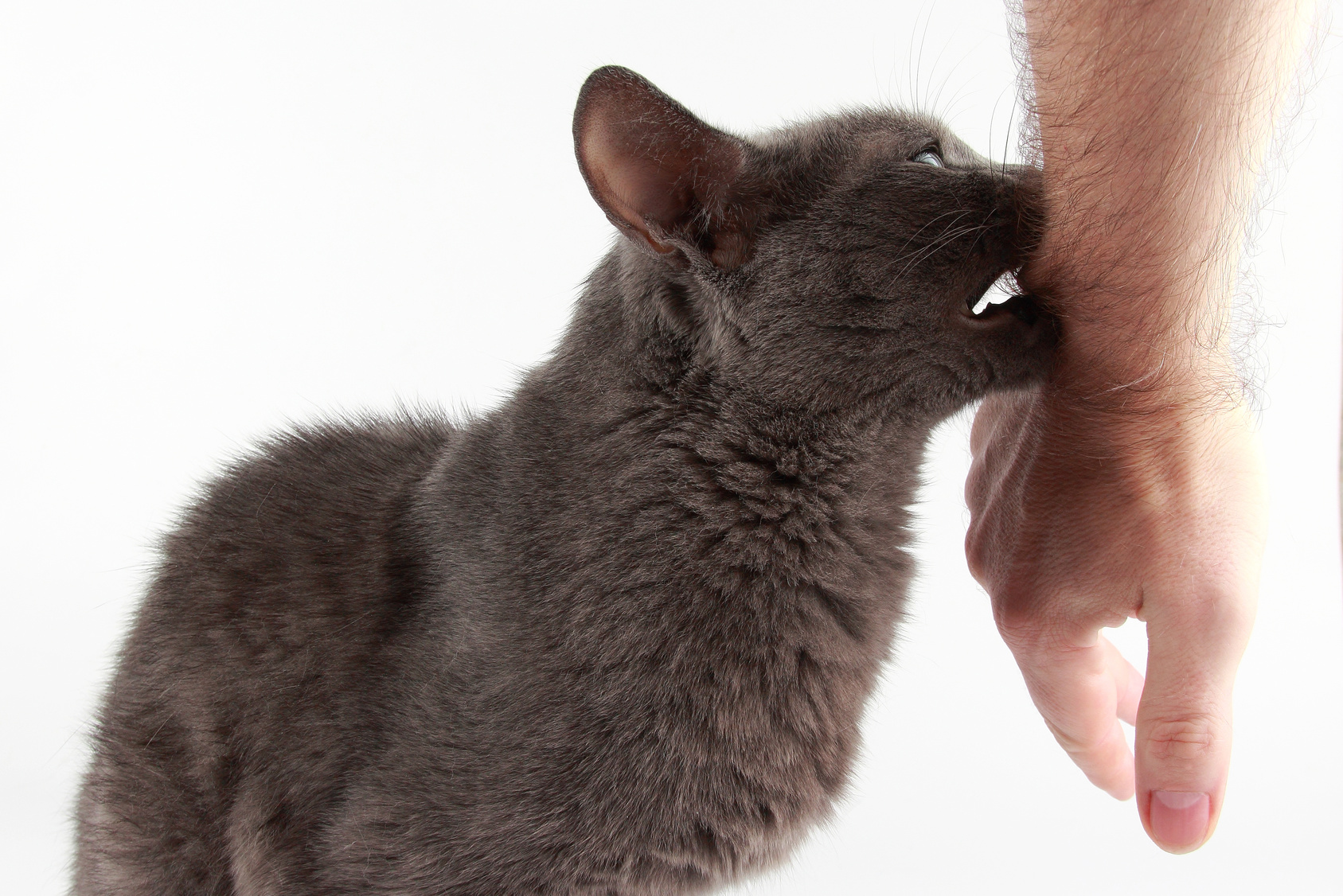Is your feline friend feeling stressed? Identifying the signs and determining the causes of stress in your cat could save you from a host of issues.
Managing a stressed cat isn't a walk in the park, and prolonged stress can lead to a variety of health and behavioral problems.
Are you already dealing with your cat's behavioral or health issues? Could stress be the culprit?
From litterbox troubles and aggression to skin conditions and digestive problems, a wide range of health and behavior issues can be triggered or worsened by your cat's anxiety.
In this article, we'll help you navigate the world of feline stress, explore its potential causes, and discover the most effective ways to address it. Keep reading to ensure your cat's well-being and happiness.

What Is Stress Anyway?
Stress is a word we often use in our daily lives, usually meaning a sense of being worried about something, sometimes to the point of feeling overwhelmed.
We worry about our health, our loved ones, money issues, getting stuck in traffic... it’s a long list indeed.
But what about our cats? What stresses out our cats, and how does that stress affect them?
Cats are creatures of habit and tend to see change as a threat. Even positive change can trigger the body’s fight-or-flight mechanism, causing the release of adrenal hormones.
For our kitties, environmental changes, or changes within their own body (such as diseases) can all trigger anxiety and stress.
What Causes Stress In Cats?
Stressors, or causes of stress, can be tricky to identify. It is the perception of threat, rather than an objective level of risk, that causes anxiety.
Therefore, something may cause stress in one individual, human or feline, and not in another. Some cats are just more prone to stress, being more sensitive to changes and disturbances in their environment. These cats tend to see potential threats everywhere.
Psychologists have lists of potential causes of stress in people. Generally speaking, these lists include two types of stressors:
1. Events - either positive ones such as engagement and marriage, the birth of a child, or moving to a new home, or adverse events such as getting a divorce, losing one’s job, or a death in the family.
2. Chronic stressors - things you have to deal with regularly. Dealing with a demanding boss, teenage kids, or a noisy environment can create a constant level of stress that can eventually take its toll.
The Effects of Stress on Cats
All living beings are affected by stress, and cats are no exception. In the long term, consistently elevated stress levels can be harmful. In humans, they are associated with depression, a weaker immune system, and even cancer.
Stress likely has a similar effect on cats. Reports indicate that stress can trigger or exacerbate medical conditions such as FLUTD, asthma, skin allergies, stomatitis, pancreatitis, inflammatory bowel disease, liver inflammation, and even FIP.
Behavioral problems are a typical result of increased stress levels. They can be reasonably quick responses to acute stress, or develop over time. Practically any change in the cat’s behavior, and any reported behavior problem, can have its roots in increased stress levels.
Read more: Behavior Problems in Cats and How to Solve Them
Stress is a part of life, and pretty much everything and anything can stress some cats. Events, situations, and ongoing conditions can all create some amount of stress.
The reaction to stress varies significantly from one cat to another, with some felines being far more sensitive than others. However, extended exposure to significant stressors can overwhelm even the most resilient cat.
Is Your Cat Stressed Out?
So, how can you tell if your cat is stressed out? How to tell when stress overload becomes a problem that needs to be addressed? Let's take a look at some of the clues.
The Body Language of Stress in Cats

If you know your cat well, you probably can tell a lot from their body language. Generally speaking, cats instinctively react to stressful events as they would to a potential threat.
In terms of body language, you will notice the cat becomes attentive and focused on the source of the perceived threat. The cat’s pupils are likely to become dilated, and his or her tail may start wagging.
You may even see the cat adopt a defensive or aggressive body position, perhaps arching his back.
As long as this reaction is limited to the situation at hand, it’s perfectly normal. It only becomes an indication of too much stress if it’s repeated often, even when there is no apparent trigger.
It’s as if the cat is always on the alert and ready to defend itself from an unseen foe.
Changes In Behavior When Your Cat Is Stressed
Sometimes, the cat’s body language does not provide the clues we need. This could be the case with cats that are less aggressive by nature, or possibly more introverted.
With these cats, stress overload can manifest itself in other ways. Any of the following changes in behavior can mean your cat is over-stressed:
- Excessive shedding
- Excessive Grooming
- Change in sleep patterns (too much or too little sleep)
- Hiding
- Change in appetite
- Aggression
- Elimination issues
- Spraying
- Excessive vocalization
- Pacing and general restlessness
Sometimes the more minute changes go unnoticed until, given time, they become full-blown behavior problems that are impossible to ignore.
As owners, we should try to be aware of our cats' behavioral patterns. If you notice any changes, don’t wait for it to become a problem. Try to address the situation before your cat develops a behavior problem.
SIGN UP FOR THECATSITE'S EMAIL UPDATES >
Ruling Out Medical Issues
We can’t stress enough (no pun intended) just how important a medical check-up is at this point.
Stress is a tricky thing: Not only can it make your cat ill, but its symptoms can also be a manifestation of existing medical problems.
If your cat shows any of the symptoms of stress listed above, your vet must first rule out health problems. For example, excessive shedding and grooming could be the result of a skin problem; urinating outside the litter box can be the result of FLUTD (the feline form of UTI).
Trying to diagnose stress overload without a full medical check-up is futile. Trying to manage stress without treating potential underlying health problems can cause more stress and fuel the fire.
How To Assess Stress In Cats
A clean bill of health, changes in the cat’s demeanor and behavior, and an accumulation of stressors in the cat’s history all mean you’re dealing with a stressed-out cat.
Stress patterns can be complex. For example, a disease can be caused, at least in part, by elevated stress levels, but it can also be a stressor in its own right.
When evaluating the condition of a cat, especially when dealing with behavioral problems, it’s vital to go over the list of potential stressors and identify the ones that may be at the root of the problem.
Only by addressing these stressors, can we achieve a long-term solution to the problem. Just remember to look into potential medical issues first.
Once your veterinarian rules out medical issues, it’s time to try and determine what might be stressing out your cat. You'll find below an extensive list of common stressors in cats. Take a minute to go through it.
Ask yourself: Which of these may have affected your cat in the past months?
Some of these are unavoidable; others may be changes with a long-term positive outcome. Either way, they cause stress to your cat, and you should be aware of that.
Even if your cat is relatively “stress-resistant,” stressors can add up and create a stress overload, eventually bringing on behavioral and health problems.
Physical Causes Of Stress In Cats
- A visit to the vet or being hospitalized at the veterinary clinic
- Physical trauma
- An illness
- Parasites
- Surgery
- Declawing
- New medication (physiological effects)
- Vision and/or hearing loss (sometimes gradual)
- Flea/tick treatments
- Deworming
- Wearing an E-collar (the “cone”)
- Chronic or acute pain
- Going into heat
- Pregnancy
- Lactating
- Being medicated (aversion to being pilled)
- Getting a bath
- Getting a haircut
Dietary Causes Of Stress In Cats
- Change in type of food
- Weight loss diet and limiting food
- Nutritional deficiencies or an unbalanced diet
- Thirst or hunger
The Litter Box As A Stressor for Cats
- Not enough Litter boxes (having to “wait”)
- Dirty litter box
- A change in the type of litter
- A change in litter box type
- A change in the location of the litter box
Other Environmental Changes
- Moving to a new home
- Renovating or remodeling the house, changing the decor
- Loud noises like thunderstorms, fireworks, construction, and dogs barking
- Strong odors
- Starting to wear a collar
- Being adopted
- Living in a shelter
- Traveling
- Being boarded
- Getting lost
- Change in daily routine
- Change in seasons and Daylight Saving Time
- Limiting access to rooms in the house
- Confinement to a single room or crates and carriers
- House too hot or too cold
- Loud music or television
- Surprises and “booby traps”
- Scary cat toys
- Earthquakes
- Extreme weather conditions
- Not enough physical activity
- Sudden change in levels of physical activity
- Boredom and lack of stimuli
- Not enough options to climb
- Harassment and/or attacks by a dog or another pet
- A new pet in the household
- Participating in a cat show
People Issues That Cause Stress In Cats
- New baby in the house
- A death in the family
- Guests in the house
- New roommates or roommates leaving
- Owner starting a new job
- New spouse
- A family member leaving the household (going to college etc.)
- Physical abuse by children or adults
- Being shouted at
- Being punished in any way
- Aggressive play with human
- Stress in humans
- Training of any kind (harness, use of the toilet, etc.)
- Excessive petting or attention
- Too little attention
Other Cats As Stressors In A Cat's Life
- Introduction to a new cat (especially when not done right)
- Food rivalry - having to compete with other cats during mealtime
- General competition with other cats in the same household
- Sounds of catfighting/howling
- Harassment and attacks by another cat or cats, especially when using the litter box
- Unknown cats showing up near the home
- The smell of another cat’s territorial urine marking
How To Deal With Stress In Cats
Now that we know what stress is, how it's expressed, and what the possible causes may be, it's time to look into stress relief for cats.
Here are six strategies you should consider as stress relievers for your feline:
1. Dealing With Potential Stressors
Go back to the list of potential stressors above. Can you recognize any that may be affecting your cat?
Your first step is to identify specific potential stressors and try and address them.
For example, if your cat suffers from a lack of stimuli, invest in cat furniture and toys, and introduce interactive playtime to your daily schedule.
If your cat has to fight over its food, make sure cats have separate food dishes and consider feeding in different areas.
If you’re not sure how to eliminate a specific potential stressor, post a question about it in our Cat Behavior forums, and we’ll try to help.
Some stressors cannot be eliminated, in which case you may need to work on ways to reduce stress in general, so keep on reading.
2. Create A Safe Haven
An easily accessible safe area can do wonders for an over-stressed cat. This area needs to be a place free of harassment by other cats, pets, or children.
Your cat's haven can be in a separate room, or it can be more compact, like a private shelf or cat tree, high enough to be out of reach for dogs and small humans.
Try to create a space that's free from things that are stressful to your cat. If your cat is sensitive to loud noises, it should be a quiet room with insulated windows.
If there are external visual cues, such as the sight of a strange cat in the backyard, block that line of vision with drapes.
There are no hard-set rules for this—you need to identify your cat's specific stressors and work to eliminate them from the safe zone.
3. Playtime Therapy
You should play with your cat often, regardless of any behavioral issues. Since interactive playtime generally reduces stress, you can also use that as a technique to help a stressed-out kitty.
Playing together is a good way for humans to de-stress as well, so you get a two-for-one deal in the stress-fighting department!
Interactive playtime provides your cat with exercise, positive interaction with their favorite person, and the opportunity to release pent-up aggression with simulated hunting. It’s a great way to de-stress most cats.
A word of caution: Make sure to introduce playtime gradually. Observe your cat’s reactions and don’t overwhelm them with a new playtime routine all at once.
If your cat is afraid of the toy, put it aside and try to get something lighter and less intimidating. Once you set your playtime routine, stick to it, at regular hours.
Read more: Playing With Your Cat 10 Things You Need To Know
4. Try Feliway Or A Similar Product
You've probably seen your cat rubbing its body, and more specifically, head and neck, against doorways, wall corners, furniture, and even your legs. When cats do that, they smear pheromones secreted from special glands on their neck and head.
Odorless to us, but remarkably noticeable to cats, these pheromones are used to mark the cat’s territory as being safe.
Feliway is a synthetic version of these pheromones, sold in the form of a spray or diffuser. It creates a sense of security and safety in your cat’s environment. Feliway is especially useful when dealing with territorial stress.
Click Here To See This Pheromone Diffuser On Amazon
Click Here To See This Pheromone Spray On Amazon
You may consider giving it a try if you think your cat’s stress is related to a change in the environment, such as moving to a new house or having a new cat or pet in the household. It can also be useful in multi-cat households and specifically in cases of spraying.
5. Anti-Anxiety Drugs
If you can’t control the stressors, or for any other reason, can’t deal with your cat’s stress-induced symptoms or behaviors, your vet may suggest drug therapy.
With an array of anti-anxiety meds, your vet may try more than one treatment before you come up with one that effectively deals with the cat’s stress.
More on these anxiety medications for cats in a minute.
6. Reducing Stress in Humans
Cats are sensitive and can often pick up on our own stress. If you’re under a lot of stress yourself, you may need to deal with your personal stress overload first.
Reducing your own stress levels will do you a world of good, and will improve your cat’s quality of life as well.
Even if you can’t reduce stress levels for yourself, or other family members, make an effort not to let it out on the cat.
It’s always a good idea not to shout at your cat or punish her in any way. It’s crucial when dealing with an over-stressed feline.
The Vicious Cycle of Human-Feline Stress
Occasionally, one of our members posts in the cat behavior forum asking for advice on what is a stress-related behavioral issue.
It soon becomes evident that the member is stressed too, often not due to the cat's issue but to various life circumstances.
It can be a vicious cycle: a stressed owner projects anxiety, making the cat more prone to behavioral problems.
In turn, this causes the owner more stress, and on it goes, spiraling into a situation where both humans and pets are trapped in the claws of stress and anxiety.
The Impact Of The Stress Cycle
It's important to understand the dynamics at play here. When stress is the issue, humans and felines can affect each other in positive or negative ways:
Ideally, a cat can be a source of comfort, soothing our minds and heart and allowing us to meditate on the sound of that gentle, rhythmic purr. Unfortunately, things aren't always idyllic.
For some humans, even the antics of an active kitten can induce stress.
Others may find it challenging to deal with nighttime feline activities to the point of constant stress due to sleep deprivation.
Taking into account complications caused by medical or behavioral issues—possibly made worse by financial ramifications—keeping a cat can become a source of anxiety for most cat owners.
We have a similar effect on our cats. We can and should provide Kitty with a reassuring presence by caring not only for her physical needs but also for her mental well-being.
Unfortunately, when things go sour, the human presence can become a source of anxiety. Not respecting the cat's personal boundaries, creating a hectic home environment, or punishing the cat in any way, can all contribute to elevating a cat's stress levels.
The thing to remember is that these are effects and counter-effects. When either human or a cat is stressed, it is more likely to affect the other party in a similar way, regardless of the original source of stress.
You Can Break The Vicious Cycle Of Stress!
First, lower your own stress levels. Whatever the source of your anxiety, deal with it. Not only for yourself but for your cat's peace of mind as well.
By becoming more relaxed, you will create a more soothing environment for your cat.
There are many ways to lower one's stress levels naturally. Getting enough sleep, eating well, and meditating can all help. Some people use medications to combat stress.
Whatever you choose, take care of yourself so that you can take better care of your cat.
Anxiety Medication for Cats

When cat owners face behavior problems, such as litter-box avoidance or aggression, changes to the cat’s routine and various training techniques are usually suggested.
However, there are times when behavior modification techniques are not enough. They fail to work because the cat, either due to its genetically-encoded temperament or due to life circumstances that cannot be changed, is simply too high-strung.
Psychiatric drugs, and specifically anti-anxiety medication, can help put the cat at ease. Sometimes that alone can stop unwanted behaviors.
Other times, medications set the stage for the cat to respond to behavioral therapy.
The information provided here is not intended to replace veterinary advice, but to give you some understanding of the common psychiatric drugs prescribed for cats.
Your vet should always be an active part of any behavioral therapy, preferably alongside a certified cat behaviorist.
Drugs For Immediate Anxiety Relief In Cats
In cases of severe aggression, your vet is likely to suggest a quick fix using one of the drugs in the Benzodiazepine group. Benzodiazepines offer immediate relief for the sudden onset of panic and fear, the driving forces behind feline aggression.
Benzodiazepines take effect within hours of being administered, calming down the cat, sometimes to the point of becoming sleepy.
These drugs are not recommended for long-term use, but they do offer the first line of defense. They are often used alongside long-term medications, to ease the beginning of the treatment.
Common drugs for immediate anxiety relief in cats are:
- diazepam (Valium)
- alprazolam (Xanax)
- lorazepam (Ativan)
Long-Term Anti-Anxiety Drugs for Cats
Much like people, some cats require long-term drug intervention to help them deal with stress and anxiety. These cats develop behavior problems that are difficult to treat without medication to lower their stress levels.
Ongoing litter-box problems, aggression, and obsessive grooming are just a few of the issues that can be helped by these drugs. In many cases, a combination of psychiatric drug therapy and behavioral modification techniques is needed.
The medication works by increasing the levels of some neurotransmitters in the cat's brain, usually serotonin and sometimes norepinephrine as well.
This is a gradual process, and its effect is felt within weeks, not hours or days. In fact, it may take several months before the results of the treatment can be evaluated.
There are three types of long-term anti-anxiety drugs:
1. Tricyclic antidepressants or TCAs. Common TCAs that are often prescribed for cats include amitriptyline (Elavil or Tryptanol), clomipramine (Anafranil or Clomicalm), doxepin (Aponal), imipramine (Antideprin or Deprenil), and nortriptyline (Sensoval).
2. Selective Serotonin Reuptake Inhibitors or SSRIs. They include fluoxetine (Prozac), paroxetine (Paxil), and sertraline (Zoloft).
3. Serotonin (5-HT) Agonists. The only drug in this family commonly used on cats is Buspirone. Buspirone is a common choice to treat spraying and litter-box issues, and it’s often used in combination with other long-term psychiatric drugs for added effect.
Side Effects Of Anxiety Medication For Cats
Like any medication, some of these drugs can have immediate or long-term side effects.
Benzodiazepines can induce increased appetite and sleepiness. In high dosages, they can affect the cat’s sense of balance and make them appear dizzy or disoriented.
TCAs can cause water retention, inducing excessive drinking, and sometimes foaming at the mouth. Our member Feralvr's Pipsqueak had stress-induced bladder issues:
We started him on Elavil (Amitriptyline) 10 mg. per day to start. It definitely calmed his bladder as he was not running to the litter box constantly. He was able to retain his urine longer giving his bladder time to settle. The downside to me was that my Pip was really not himself during that time but I realized that he needed this for the time being.
We did cut him down to 5 mg. and that allowed him to be more like himself but without the drowsiness. He was on it for about three months and then we took him off the drug. Things were miraculously improved even off of the drug as far as his bladder was concerned. My Pip was back and took on his roll of house guardian once again.
TheCatSite.com Forum
These medications are processed in the liver and kidneys. Your vet should check liver and kidney functions before prescribing them and at regular intervals during the course of treatment.
Choice Of Drug And Dosage Issues
Finding the right psychiatric drug can be a challenge. Some cats may respond well to one medication, but not to another. What’s more, getting the dosage right can be tricky too.
This is not an exact science, and you need to work closely with your vet, reporting results as well as side effects to fine-tune the treatment and get the best results. In other words, be prepared for a potentially long and sometimes confusing journey.
Length Of Treatment
The length of treatment depends on the specific problem. When using a long-term medication, a few months is usually the minimum for the drug to take full effect.
Once the original issue has been addressed, should the cat stay on anti-anxiety medication for life? There is no single answer to this question.
Many times your vet still suggests weaning the cat off the medication, but if the problem recurs, your cat may need to go back on the pill for good.
Lesliecat shared a positive experience, where the cat was successfully treated and was taken off the medication:
Several years ago I brought a new cat home. Everyone acclimated pretty well except for one cat. She started stalking the new cat. She would corner it and beat up up on it. I put her on Prozac (can't remember the dosage) and what a difference.
She no longer paid any attention to the new cat. She did not sleep any extra and ate normally. After a few months I took her off the Prozac. Her behavior continued to be good towards the other cat.
TheCateSite.com Forum
We hope you find this guide helpful. Handling stress in cats can be challenging, but it is an important skill that every cat owner should be aware of. Comments? Leave them using the comment section below. Questions? Please use the cat forums for those!
SIGN UP FOR THECATSITE'S EMAIL UPDATES >
Note: We may get commissions for purchases made through links on this page.








30 comments on “Stress in Cats – The Ultimate Guide”